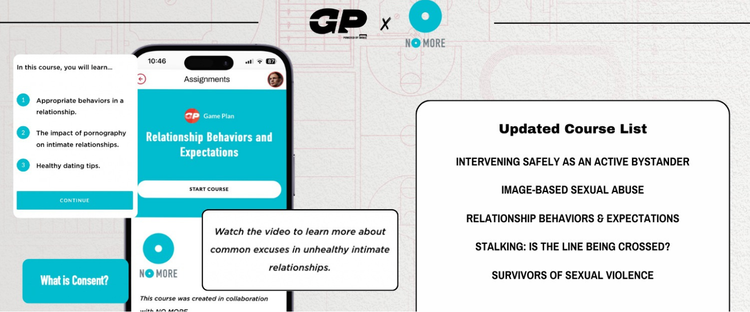Understanding Consent

Sexual violence impacts 1 in 3 women and 1 in 6 men. These numbers are staggering, and we owe it to survivors everywhere and our communities to search for solutions and change these statistics.
Research from the National Sexual Violence Resource Center (NSVRC) showing that 1 in 3 men don’t believe that intercourse resulting from coercion and pressure is sexual assault, we see that one solution is clearing up fundamental misunderstandings about consent.
As one of many steps to change the way our culture views sexual assault, and to help prevent it from happening, we need to have frank discussions about consent, and what constitutes assault.
Check out the info below to learn more about consent. Remember that if you have been impacted by sexual assault, you can contact the National Sexual Assault Hotline at 1-800-656-4673 for free, confidential services or visit a local rape crisis center.

What is consent?
Consent is a voluntary, enthusiastic, and clear agreement between the participants to engage in specific sexual activity.
If clear, voluntary, coherent, and ongoing consent is not given by all participants, it’s sexual assault. There’s no room for ambiguity or assumptions when it comes to consent, and the rules don’t change for people who have engaged in sexual activity before.
Consent should always be:
- Clear. Consent is unambiguous. Is your partner enthusiastically engaging in sexual activity? Have they given verbal permission for each sexual activity? Then, you have explicit consent. Silence is not consent. Never assume you have consent — you should clarify by asking.
- Ongoing. You should have permission for every activity at every stage of a sexual encounter. It’s also important to note that consent can be removed at any time — after all, people do change their minds!
- Coherent. Every participant in sexual activity must be capable of granting their consent. If someone is too intoxicated or incapacitated by alcohol or drugs or is either not awake or fully awake, they’re incapable of giving consent. Failure to recognize that the other person was too impaired to consent is not “drunk sex.” It’s sexual assault.
- Voluntary. Consent should be given freely and willingly. Repeatedly asking someone to engage in a sexual act until they eventually say yes is not consent. It’s coercion. Consent is required for everyone, including those in a committed relationship or married. No one is obliged to do anything they don’t want to do, and being in a relationship doesn’t obligate a person to engage in any type of sexual activity.
When and how should I ask for consent?
It’s crucial to ask for consent before engaging in sexual activity. Talking openly about what you both want and setting boundaries is essential in any casual or long-term relationship.
In a healthy sexual encounter, both parties should feel comfortable communicating their needs without feeling fearful. If you’re initiating sex, and you become angry, frustrated, or insistent when your partner declines any sexual activity, this is not okay.
Sexual or nonsexual activity that occurs because of fear, guilt, or pressure is coercion — and coercion is a form of sexual assault. If you’re engaging in sexual activity and the person declines to go further or seems hesitant, stop for a moment and ask them if they’re comfortable doing that activity or if they want to take a break.
There are plenty of ways to start the discussion when obtaining consent. You could get right to the point and ask your partner:
- Can I kiss you?
- Can I take this off? What about these?
- Do you want to have sex, or would you like to wait?
- Can I [fill in the blank]?
You can also take the opportunity to use open communication about sex and boundaries as foreplay. Here are some ideas:
- I think it’s hot when we [fill in the blank]. Do you want to do this?
- It feels so good when you [fill in the blank]. Do you want to do this?
- Can I take your clothes off?
- Can I kiss you here?
If you’re already in the heat of the moment, you could say:
- Are you comfortable with me doing this?
- Do you want me to stop?
- How far are you comfortable going tonight?
Remember that consent needs to be ongoing. This means even if you’re in the throes of a heavy make-out session or foreplay, your partner needs to consent before you take things to the next level.
It's important to ask if they’re comfortable, if they want it, and if they want to keep going, so keep communicating and don’t just make assumptions.
Can I get consent if we're under the influence?
There are times when gaining consent is especially important, like when one or all participants are under the influence of drugs or alcohol. We’ve all heard discussions about consenting under the influence, and in truth, it is a tricky subject. It’s unrealistic (and not legally accurate) to say consent isn’t possible if the parties have been drinking. Plenty of people drink and remain coherent enough to consent.
However, studies show a direct relationship between excessive alcohol consumption and the risk of committing sexual assault. Approximately one-half of sexual assaults involve alcohol consumption by the perpetrator, the person who’s been assaulted, or both.
If either party is under the influence of drugs or alcohol, it’s even more important to communicate your boundaries and be extra sensitive to your partner’s boundaries.
Here are some good guidelines to follow:
- If you’re initiating sexual activity, you’re responsible for obtaining consent. If either person is under the influence, the definition of consent — clear, ongoing, coherent, and voluntary — is just as important as ever.
- If someone is stumbling or can’t stand without leaning on something, slurring their words, falling asleep, or has vomited, they’re incapacitated and cannot consent.
If someone doesn’t exhibit any of the above signs but you know that they’ve been drinking or taking drugs, The Good Men Project recommends asking something like, “Do you feel clear enough to be making decisions about sex?” And regardless of what your partner says in response, if YOU feel they’re not clear enough, just stop.
What does consent look like in the moment?
Knowing what consent sounds and looks like is critical for preventing sexual assault. You know you have consent when the other person has clearly said yes — without being pressured — and has given you permission to do something. If you and your partner are communicating consistently, respecting each other’s boundaries, are not coercing each other, and are not incapacitated by drugs or alcohol—then you are engaging in consensual sexual activity.
It’s also critical to recognize what consent DOES NOT look like. If you are engaging in sexual activity with someone who is incapacitated by drugs or alcohol, you are committing sexual assault. If you’ve coerced or pressured someone into sexual activity, you don’t have consent. If you ignore your partner’s boundaries or their nonverbal cues to stop, like pushing you away or shaking their head, 'no,' then you are committing sexual assault.
How can I read my partner’s verbal and nonverbal cues?
Both verbal and nonverbal cues can indicate whether a person is consenting to sexual activity. Verbal cues are when the person uses words to express what they want or don’t want, while nonverbal cues are given using body language. Both types of communication are easy to read as long as you pay attention.
Verbal consent is especially easy to spot. If your partner says, “I want to, I want you to, Yes, don’t stop,” then you have obtained verbal consent. On the other hand, if your partner is saying any of the following, then you DO NOT have consent, and you should stop engaging in sexual activity:
- No
- Stop
- I don’t want to
- I don’t know
- I’m not sure
- I don’t think so
- I want to, but…
- This makes me uncomfortable
- I don’t want to do this anymore
- This feels wrong
- Maybe we should wait
- Changing the subject
A person might communicate that they don’t consent by using actions and body language. These are possible nonverbal cues that indicate that you don’t have consent:
- pushing away
- pulling away
- avoiding eye contact
- shaking their head, no
- silence
- not responding physically — just lying there motionless
- crying
- looking scared or sad
- not removing their clothing
Even if a person appears to be giving nonverbal cues that make it seem like they’re into it and want to have sex, make sure you get verbal consent before continuing. Be sure, and don’t just assume.
What are some basic guidelines for consent?
Discussions about consent may sound complex, but the ideas are simple. When obtaining consent, here are some basic guidelines to remember:
- Consent can be withdrawn at any time, even if you’ve already started getting intimate. All sexual activity must stop when consent is withdrawn.
- Being in a relationship doesn’t oblige anyone to do anything. Consent should never be implied or assumed, even if you’re in a relationship or have had sex before.
- You don’t have consent if you use guilt, intimidation, or threats to coerce someone into sex, even if that person says “yes.” Saying yes out of fear is not consent.
- Silence or a lack of a response is not consent.
- Be clear and concise when getting consent. Consenting to go back to your place doesn’t mean they’re consenting to sexual activity.
- If you’re initiating sex with someone who’s under the influence of drugs or alcohol, you’re responsible for obtaining ongoing, clear consent. If someone is stumbling or can’t stand without leaning on someone or something, slurring their words, falling asleep, or has vomited, they’re incapacitated and cannot consent.
- There’s no consent when you use your power, trust, or authority to coerce someone into sex.
What should I do if I have been sexually assaulted?
If you have been assaulted, you might be struggling with what to do next. Remember, you are not alone; what happened is not your fault. If you are seeking help, contact the National Sexual Assault Hotline at 1-800-656-4673 for free, confidential services.
For more help understanding consent, The ‘Cup of Tea’ video (2 mins 49 secs long) is worth watching.
*Copyright ©2015 Emmeline May and Blue Seat Studios
Together We Can End Domestic and Sexual Violence






